外研版(2019)必修第二册Unit 6 Earth first Understanding ideas 公开课课件(24张PPT)
文档属性
| 名称 | 外研版(2019)必修第二册Unit 6 Earth first Understanding ideas 公开课课件(24张PPT) | 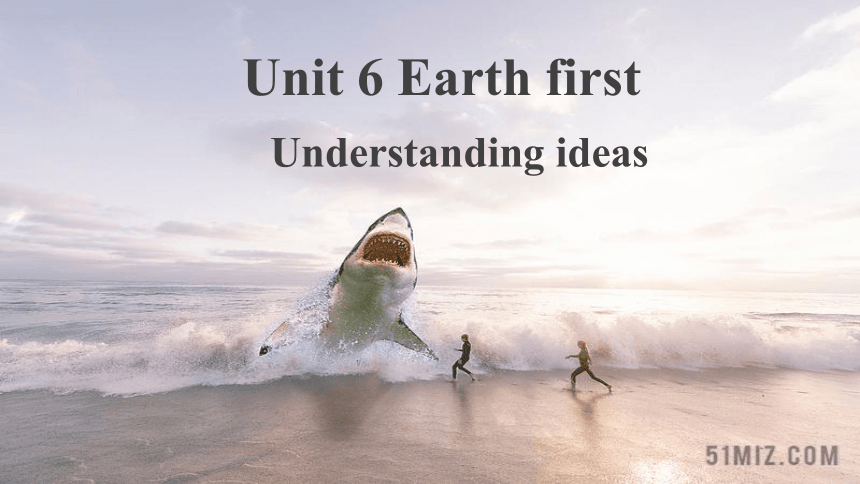 | |
| 格式 | pptx | ||
| 文件大小 | 9.6MB | ||
| 资源类型 | 教案 | ||
| 版本资源 | 外研版(2019) | ||
| 科目 | 英语 | ||
| 更新时间 | 2023-03-15 09:32:17 | ||
图片预览

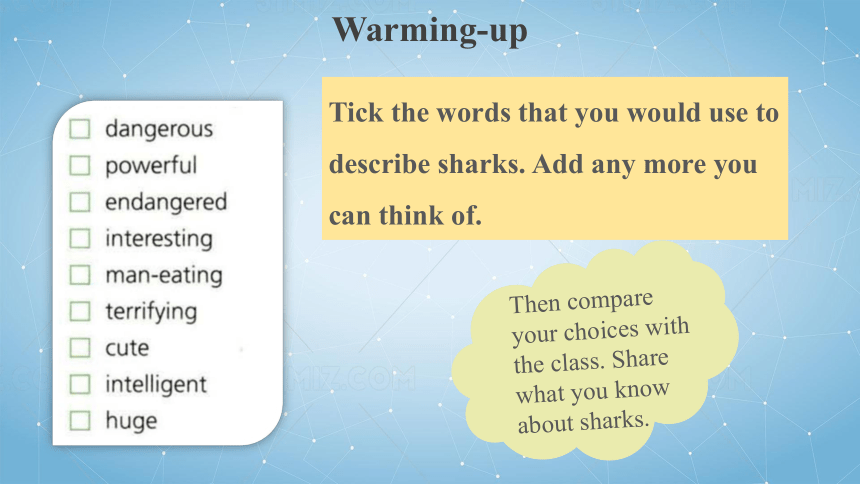
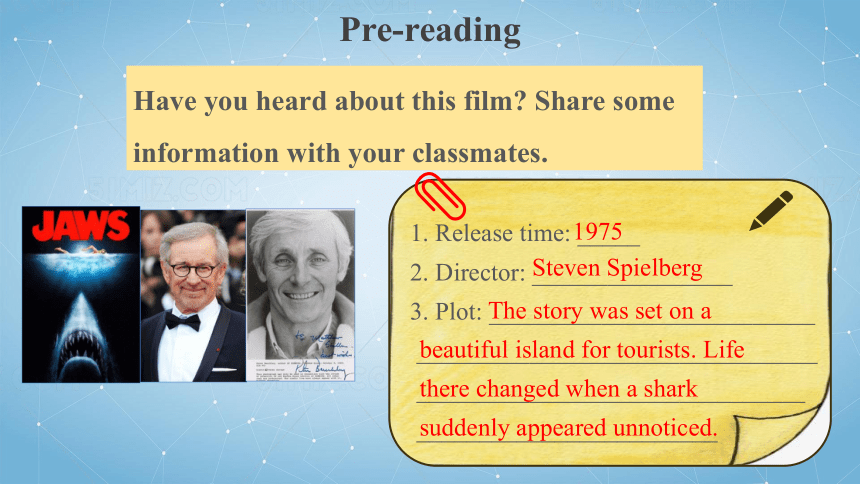
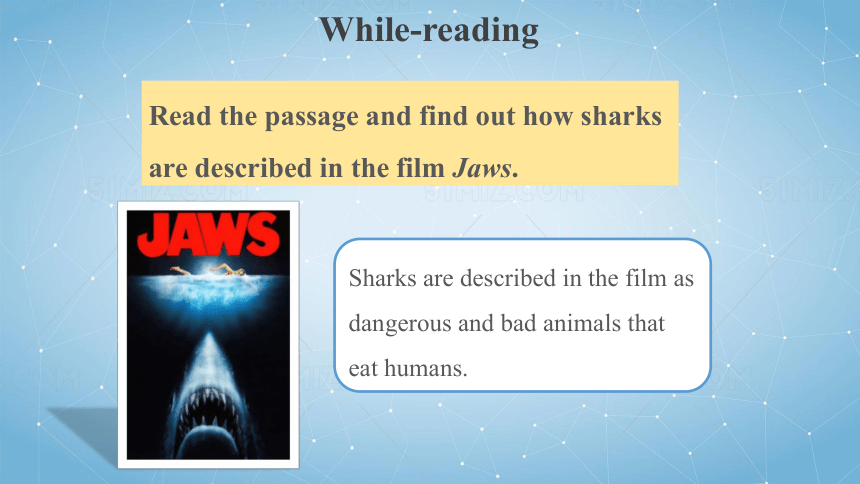

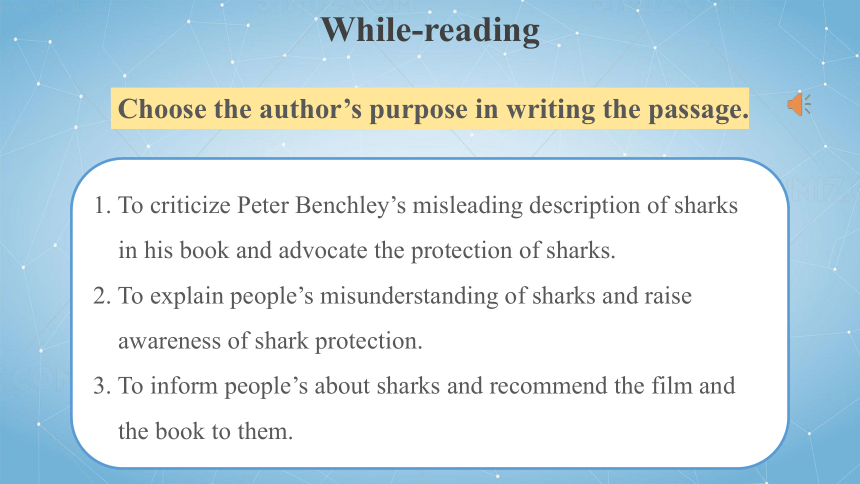
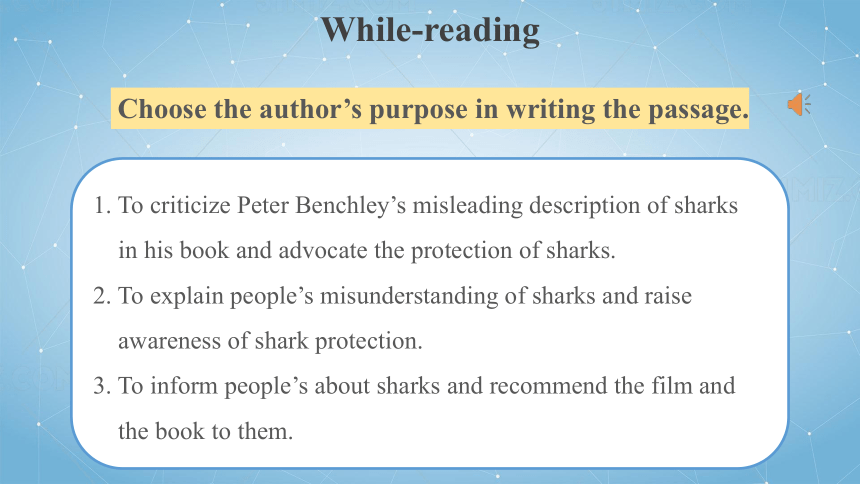
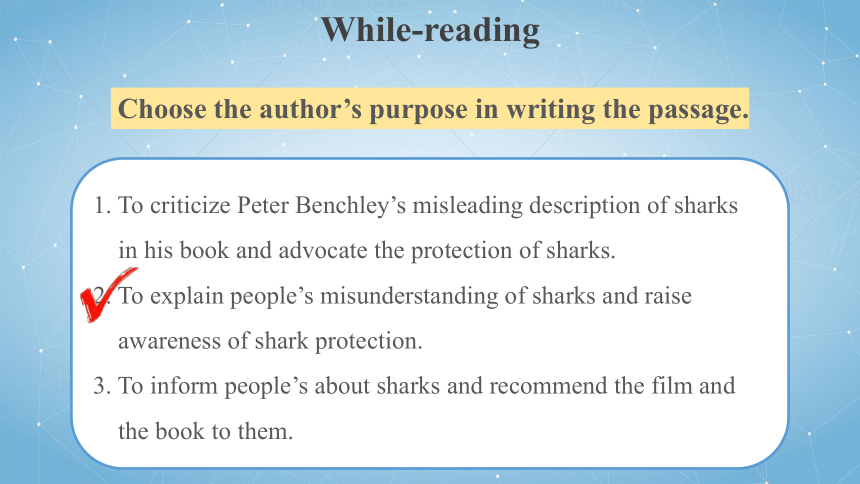
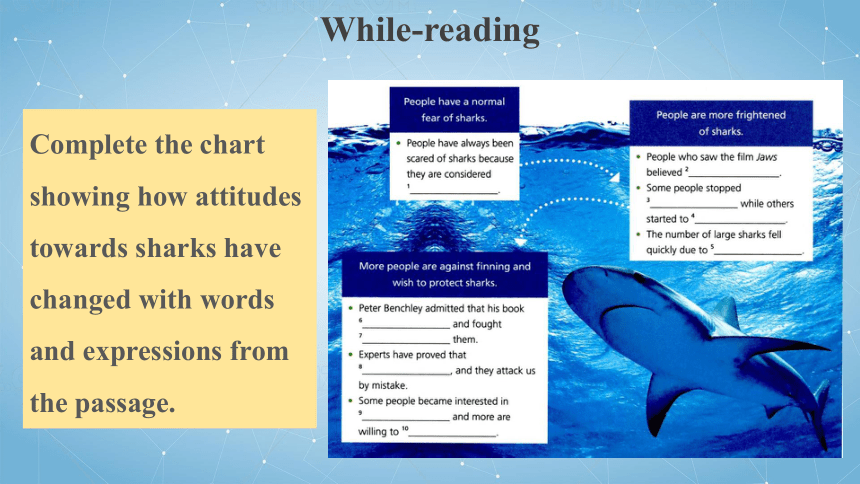
文档简介
(共24张PPT)
Unit 6 Earth first
Understanding ideas
Warming-up
Then compare your choices with the class. Share what you know about sharks.
Tick the words that you would use to describe sharks. Add any more you can think of.
Pre-reading
1. Release time: _____
2. Director: ________________
3. Plot: __________________________
________________________________
_______________________________
________________________
1975
Steven Spielberg
The story was set on a beautiful island for tourists. Life there changed when a shark suddenly appeared unnoticed.
Have you heard about this film Share some information with your classmates.
While-reading
Read the passage and find out how sharks are described in the film Jaws.
Sharks are described in the film as dangerous and bad animals that eat humans.
While-reading
Read the passage and answer the questions.
1. Around the year 1975, how did people feel
when they killed sharks
They didn’t care about killing or the death
of sharks.
2. How do people treat sharks today
More and more people want to protect
sharks from extinction.
While-reading
Choose the author’s purpose in writing the passage.
1. To criticize Peter Benchley’s misleading description of sharks
in his book and advocate the protection of sharks.
2. To explain people’s misunderstanding of sharks and raise
awareness of shark protection.
3. To inform people’s about sharks and recommend the film and
the book to them.
While-reading
Choose the author’s purpose in writing the passage.
1. To criticize Peter Benchley’s misleading description of sharks
in his book and advocate the protection of sharks.
2. To explain people’s misunderstanding of sharks and raise
awareness of shark protection.
3. To inform people’s about sharks and recommend the film and
the book to them.
While-reading
Choose the author’s purpose in writing the passage.
1. To criticize Peter Benchley’s misleading description of sharks
in his book and advocate the protection of sharks.
2. To explain people’s misunderstanding of sharks and raise
awareness of shark protection.
3. To inform people’s about sharks and recommend the film and
the book to them.
While-reading
Complete the chart showing how attitudes towards sharks have changed with words and expressions from the passage.
While-reading
as dangerous animals
sharks were bad animals that ate humans
swimming in the sea
fish for sharks
fear of sharks and finning
While-reading
6. was wrong about sharks’ behavior
7. to protect
8. sharks do not see people as food
9. understanding sharks
10. protect sharks from extinction
Post-reading
Jaws, (1) _________ (attract) huge audiences and winning many awards, tells the story of a great white shark that attacks and kills swimmers. It misled people to see sharks (2) _____ horrible animals, which made more sharks (3) _______ (kill).
Besides this, because of finning, (4) _____ number of large sharks around America fell quickly, and soon fell around the world. In 1980, Peter Benchley, the man who wrote the book the film Jaws (5) __________ (base) on came across the awful sight (6) _________ the sea floor was covered with dead sharks. He admitted that his book was wrong about sharks’ (7) __________ (behave) and began to fight to protect sharks.
(8) ____________ (fortunate), more and more people became interested in
(9) _____________ (understand) them and protect them from (10) __________ (extinct).
attracting
as
killed
the
was based
where
behaviour
Fortunately
understanding
extinction
Fill in the blanks according to the text.
Post-reading
1. How do you think Peter Benchley felt after diving in 1980
Peter Benchley might feel sad for the sharks being killed; he might feel
regretful for depicting the great white shark as a dangerous animal in his
book; he might also feel angry about finning.
2. What other films or books do you know that feature wild animals Do
they “paint” a good or bad picture of these animals Say how the animals
are described.
Think and discuss the questions.
SHARKS: DANGEROUS OR ENDANGERED
We see a woman swimming at night in a dark sea. Suddenly, she is pulled underwater①. She surfaces②, cries in fear, then disappears forever. This is the opening scene from the 1975 film Jaws, [1]showing a shark attack.It tells the story of a great white shark that attacks and kills swimmers. Jaws was a great success, attracting huge audiences and winning many awards.It strengthened people's long-held③ idea of the great white shark as a dangerous animal.
[1]动词-ing短语作定语,可改写为定语从句which shows a shark attack。
①underwater adv.在水面下
②surface vi.升到水面,
浮出水面
③long-held长期持有的
People have always been scared④ of sharks, but Jaws [2]made things worse.It made people frightened of sharks, especially of the great white shark.[3]Many people who saw the film started to believe that sharks were bad animals that ate humans.Some people stopped swimming in the sea, [4]afraid of the horrible creature from the film. Other people started fishing for sharks, [5]killing as many as they could.At that time, nobody cared if sharks were killed, or how many were killed. People just wanted them killed.
④scare v.使(某人)
惊恐,吓唬
After 1975,the number of large sharks around America fell quickly, and soon fell around the world.This was not only due to⑤ fear of sharks, but also finning⑥.Finning is a type of fishing [6]where sharks are caught and their fins cut off⑦.The sharks are thrown back into the sea where they die slowly and painfully. The fins are used in shark fin soup. Finning kills millions of sharks a year.
[6]where引导定语从句,修饰先行词a type of fishing;cut off前省略了are。
⑤due to 由于,因为
⑥fin v.切去(鱼的)鳍
n.鱼鳍
⑦cut off切掉;被隔绝;
切断(供给);中断
Finning would have an unexpected effect upon Peter Benchley, [7]the man who wrote the book the film Jaws was based on.In 1980, Benchley was diving⑧ when he came across an awful sight.It was an area where fishermen were finning, and the sea floor was covered with dead sharks. Benchley [8]saw sharks being killed and this caused a deep change in him. He came to see people as a danger to sharks, rather than⑨ the other way round⑩.
⑧dive v.(通常指使用呼吸设备的)潜水
go diving去潜水
diver n.(通常指有专用装备的)潜水员
⑨rather than而不是
⑩the other way round相反的情况;颠倒过来,反过来
From that day on, he fought to protect sharks.He admitted that his book was wrong about sharks' behaviour. “Sharks don't target humans,” he said. [9]Experts have proved that sharks do not see people as food, and they attack us by mistake .Only around six people are killed by sharks every year.
target v.把……作为目标
by mistake错误地,无意中
[近义词组]by chance
偶然,意外地
[反义词组]on purpose
故意地;有意地
Fortunately ,not everyone who watched the film Jaws became afraid of sharks — some became interested in understanding them. Today, as we learn more about sharks, more people than ever want to protect them from extinction .
fortunately adv.幸运地
[近义]luckily adv.幸运地
extinction n.灭绝,绝种
be threatened with
extinction/in danger of
extinction 面临灭绝的威胁/有灭绝的危险
extinct adj.已灭绝的,绝种的
Notes
1. This was not only due to fear of sharks, but also finning.
due to 由于;由……造成;应支付;归功于
e.g. The flight was put off due to the heavy fog.
这架班机因大雾停航。
due adj. 应得的;应付的;预定的
be due to sb. 应付给某人
be due to sb. / sth. 归因于某人 / 某物
be due to do sth. 预定 / 预期做某事
表示“因为;由于”的介词
短语:
because of; on account of; as a result of; owing to; thanks to
Notes
2. In 1980, Benchley was diving when he came across an awful sight.
句中的when是并列连词,意为“就在这/那时”,相当于and then或and
at the same time。
e.g. I was thinking of this when I heard my name called.
我正想着这件事,突然听到有人叫我的名字。
when作并列连词时常用于以下句型中:
be doing … when … 正在做……这时……
be about to do … when …= be on the point of doing … when … 正在做……这时……
had just done … when … 刚做了……这时……
Notes
3. Fortunately, not everyone who watched the film Jaws became afraid of sharks—
some became interested in understanding them.
本句中not everyone是部分否定,意为“不是每个人”。
e.g. I hate to disillusion you, but not everyone is as honest as you.
我实在不愿把实情告诉你,但并非人人都像你那样诚实。
(1)英语中的all, both, each, every, everybody, everything, completely, whole, entirely等具有总括意义的代词、形容词和副词与否定词not连用,无论not位置如何,均构成部分否定,表示“并非都”的意思。
(2)若表示完全否定,可借助于no, none, no one, nobody, nothing, neither, never等。
Assignment
Let’s make our own V-blog video clip to inform the public of endangered wild lives around the world and correct people’s misunderstandings of them.
Tips:
To prepare for it, find films or books you know that feature wild animals. Gather information and describe the animals’ trouble or show scientific facts about them.
Goodbye!
Unit 6 Earth first
Understanding ideas
Warming-up
Then compare your choices with the class. Share what you know about sharks.
Tick the words that you would use to describe sharks. Add any more you can think of.
Pre-reading
1. Release time: _____
2. Director: ________________
3. Plot: __________________________
________________________________
_______________________________
________________________
1975
Steven Spielberg
The story was set on a beautiful island for tourists. Life there changed when a shark suddenly appeared unnoticed.
Have you heard about this film Share some information with your classmates.
While-reading
Read the passage and find out how sharks are described in the film Jaws.
Sharks are described in the film as dangerous and bad animals that eat humans.
While-reading
Read the passage and answer the questions.
1. Around the year 1975, how did people feel
when they killed sharks
They didn’t care about killing or the death
of sharks.
2. How do people treat sharks today
More and more people want to protect
sharks from extinction.
While-reading
Choose the author’s purpose in writing the passage.
1. To criticize Peter Benchley’s misleading description of sharks
in his book and advocate the protection of sharks.
2. To explain people’s misunderstanding of sharks and raise
awareness of shark protection.
3. To inform people’s about sharks and recommend the film and
the book to them.
While-reading
Choose the author’s purpose in writing the passage.
1. To criticize Peter Benchley’s misleading description of sharks
in his book and advocate the protection of sharks.
2. To explain people’s misunderstanding of sharks and raise
awareness of shark protection.
3. To inform people’s about sharks and recommend the film and
the book to them.
While-reading
Choose the author’s purpose in writing the passage.
1. To criticize Peter Benchley’s misleading description of sharks
in his book and advocate the protection of sharks.
2. To explain people’s misunderstanding of sharks and raise
awareness of shark protection.
3. To inform people’s about sharks and recommend the film and
the book to them.
While-reading
Complete the chart showing how attitudes towards sharks have changed with words and expressions from the passage.
While-reading
as dangerous animals
sharks were bad animals that ate humans
swimming in the sea
fish for sharks
fear of sharks and finning
While-reading
6. was wrong about sharks’ behavior
7. to protect
8. sharks do not see people as food
9. understanding sharks
10. protect sharks from extinction
Post-reading
Jaws, (1) _________ (attract) huge audiences and winning many awards, tells the story of a great white shark that attacks and kills swimmers. It misled people to see sharks (2) _____ horrible animals, which made more sharks (3) _______ (kill).
Besides this, because of finning, (4) _____ number of large sharks around America fell quickly, and soon fell around the world. In 1980, Peter Benchley, the man who wrote the book the film Jaws (5) __________ (base) on came across the awful sight (6) _________ the sea floor was covered with dead sharks. He admitted that his book was wrong about sharks’ (7) __________ (behave) and began to fight to protect sharks.
(8) ____________ (fortunate), more and more people became interested in
(9) _____________ (understand) them and protect them from (10) __________ (extinct).
attracting
as
killed
the
was based
where
behaviour
Fortunately
understanding
extinction
Fill in the blanks according to the text.
Post-reading
1. How do you think Peter Benchley felt after diving in 1980
Peter Benchley might feel sad for the sharks being killed; he might feel
regretful for depicting the great white shark as a dangerous animal in his
book; he might also feel angry about finning.
2. What other films or books do you know that feature wild animals Do
they “paint” a good or bad picture of these animals Say how the animals
are described.
Think and discuss the questions.
SHARKS: DANGEROUS OR ENDANGERED
We see a woman swimming at night in a dark sea. Suddenly, she is pulled underwater①. She surfaces②, cries in fear, then disappears forever. This is the opening scene from the 1975 film Jaws, [1]showing a shark attack.It tells the story of a great white shark that attacks and kills swimmers. Jaws was a great success, attracting huge audiences and winning many awards.It strengthened people's long-held③ idea of the great white shark as a dangerous animal.
[1]动词-ing短语作定语,可改写为定语从句which shows a shark attack。
①underwater adv.在水面下
②surface vi.升到水面,
浮出水面
③long-held长期持有的
People have always been scared④ of sharks, but Jaws [2]made things worse.It made people frightened of sharks, especially of the great white shark.[3]Many people who saw the film started to believe that sharks were bad animals that ate humans.Some people stopped swimming in the sea, [4]afraid of the horrible creature from the film. Other people started fishing for sharks, [5]killing as many as they could.At that time, nobody cared if sharks were killed, or how many were killed. People just wanted them killed.
④scare v.使(某人)
惊恐,吓唬
After 1975,the number of large sharks around America fell quickly, and soon fell around the world.This was not only due to⑤ fear of sharks, but also finning⑥.Finning is a type of fishing [6]where sharks are caught and their fins cut off⑦.The sharks are thrown back into the sea where they die slowly and painfully. The fins are used in shark fin soup. Finning kills millions of sharks a year.
[6]where引导定语从句,修饰先行词a type of fishing;cut off前省略了are。
⑤due to 由于,因为
⑥fin v.切去(鱼的)鳍
n.鱼鳍
⑦cut off切掉;被隔绝;
切断(供给);中断
Finning would have an unexpected effect upon Peter Benchley, [7]the man who wrote the book the film Jaws was based on.In 1980, Benchley was diving⑧ when he came across an awful sight.It was an area where fishermen were finning, and the sea floor was covered with dead sharks. Benchley [8]saw sharks being killed and this caused a deep change in him. He came to see people as a danger to sharks, rather than⑨ the other way round⑩.
⑧dive v.(通常指使用呼吸设备的)潜水
go diving去潜水
diver n.(通常指有专用装备的)潜水员
⑨rather than而不是
⑩the other way round相反的情况;颠倒过来,反过来
From that day on, he fought to protect sharks.He admitted that his book was wrong about sharks' behaviour. “Sharks don't target humans,” he said. [9]Experts have proved that sharks do not see people as food, and they attack us by mistake .Only around six people are killed by sharks every year.
target v.把……作为目标
by mistake错误地,无意中
[近义词组]by chance
偶然,意外地
[反义词组]on purpose
故意地;有意地
Fortunately ,not everyone who watched the film Jaws became afraid of sharks — some became interested in understanding them. Today, as we learn more about sharks, more people than ever want to protect them from extinction .
fortunately adv.幸运地
[近义]luckily adv.幸运地
extinction n.灭绝,绝种
be threatened with
extinction/in danger of
extinction 面临灭绝的威胁/有灭绝的危险
extinct adj.已灭绝的,绝种的
Notes
1. This was not only due to fear of sharks, but also finning.
due to 由于;由……造成;应支付;归功于
e.g. The flight was put off due to the heavy fog.
这架班机因大雾停航。
due adj. 应得的;应付的;预定的
be due to sb. 应付给某人
be due to sb. / sth. 归因于某人 / 某物
be due to do sth. 预定 / 预期做某事
表示“因为;由于”的介词
短语:
because of; on account of; as a result of; owing to; thanks to
Notes
2. In 1980, Benchley was diving when he came across an awful sight.
句中的when是并列连词,意为“就在这/那时”,相当于and then或and
at the same time。
e.g. I was thinking of this when I heard my name called.
我正想着这件事,突然听到有人叫我的名字。
when作并列连词时常用于以下句型中:
be doing … when … 正在做……这时……
be about to do … when …= be on the point of doing … when … 正在做……这时……
had just done … when … 刚做了……这时……
Notes
3. Fortunately, not everyone who watched the film Jaws became afraid of sharks—
some became interested in understanding them.
本句中not everyone是部分否定,意为“不是每个人”。
e.g. I hate to disillusion you, but not everyone is as honest as you.
我实在不愿把实情告诉你,但并非人人都像你那样诚实。
(1)英语中的all, both, each, every, everybody, everything, completely, whole, entirely等具有总括意义的代词、形容词和副词与否定词not连用,无论not位置如何,均构成部分否定,表示“并非都”的意思。
(2)若表示完全否定,可借助于no, none, no one, nobody, nothing, neither, never等。
Assignment
Let’s make our own V-blog video clip to inform the public of endangered wild lives around the world and correct people’s misunderstandings of them.
Tips:
To prepare for it, find films or books you know that feature wild animals. Gather information and describe the animals’ trouble or show scientific facts about them.
Goodbye!
